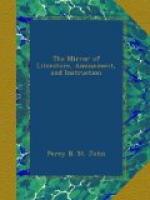HARROW SCHOOL.
[Illustration: Harrow school.]
To lofty Harrow now.—Thomson.
Harrow-on-the-hill was a place of some consideration, even before the foundation of the scholastic establishment which now forms its principal boast. The Archbishops of Canterbury had an occasional residence here, in the centuries briefly succeeding the Norman Conquest; and they obtained for the inhabitants a weekly market, long since fallen into disuse.
The Free Grammar School of Harrow, which now ranks amongst the eight great schools of England,[1] like most foundations of a similar nature, proceeded from a small beginning. In the 14th year of Elizabeth, John Lyon, a wealthy yeoman, of Preston, in this parish, procured letters patent, and special license from the crown, for the foundation of the school, to which for many years, he only contributed the sum of 30 marks annually; but in the year 1590, he developed his full intentions, provided for their observance, and drew up a code of regulations for the foundation. Among these provisions the following are curiously characteristic of the times:—The founder expresses his intention to build “meete and convenient Roomes for the said Schoole Mr and Usher to inhabite and dwell in; as also a large and convenient Schoole House, with a chimney in it. And, alsoe, a cellar under the said Roomes and Schoole House, to lay in wood and coales;” the master’s salary he fixes at L26. 13s. 4d. per annum, besides L3. 6s. 8d. on the 1st of May, towards his provision of fuel; the usher’s at L13. 6s. 8d. with L3. 6s. 8d. for fuel. The founder declares his desire that the School shall consist of a “meete and convenient number of schollers, as well of poor, to be taught freely,” (which privilege he confines to the children of the inhabitants of Harrow;) “as of others, to be received for ye further profitt and commoditie of the schoole-master.” The regulations provide for the government of the school with curious minuteness, and describe the number of forms; the books and exercises allotted to each; the mode of correction; the hours of attendance; and the vacations and play days. They extend even to the amusements of the scholars, which are confined to “driving a top, tossing a hand-ball, running and shooting.” For the purpose of this latter exercise, all parents are required to furnish their children with “bowstrings shafts, and bresters.” In consequence of this regulation it was usual to hold an annual exhibition of Archery, on August 4, when the scholars contended for a silver arrow.[2] Within the last fifty years this custom has been abolished and in its room has been substituted the delivery of annual orations before the assembled Governors.
[1] The eight principal public
schools of the kingdom are
considered
to be those of Winchester; Westminster; Eton; Harrow;
the
Charter House; Merchant Tailor’s; St. Paul’s;
and Rugby.




